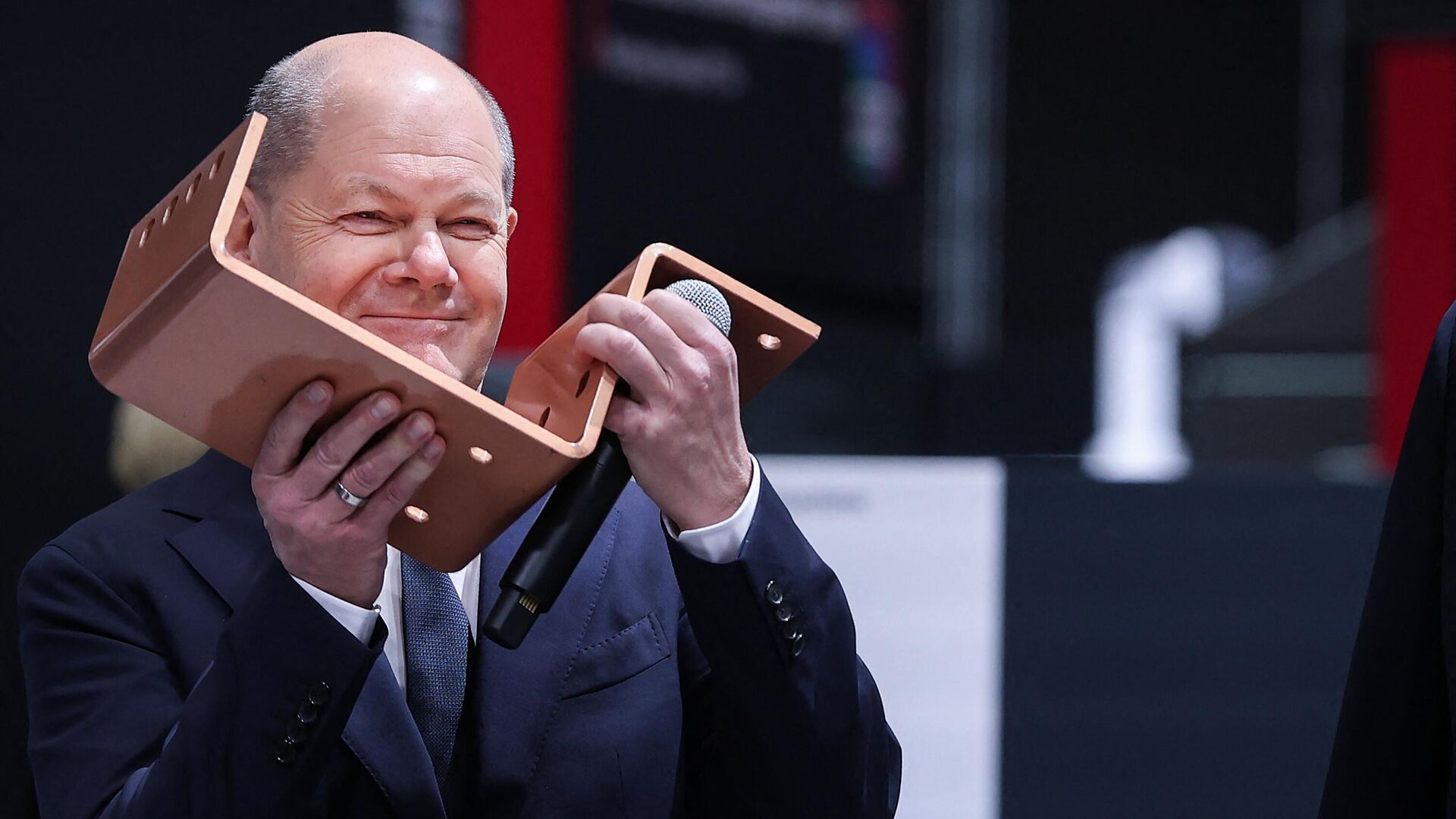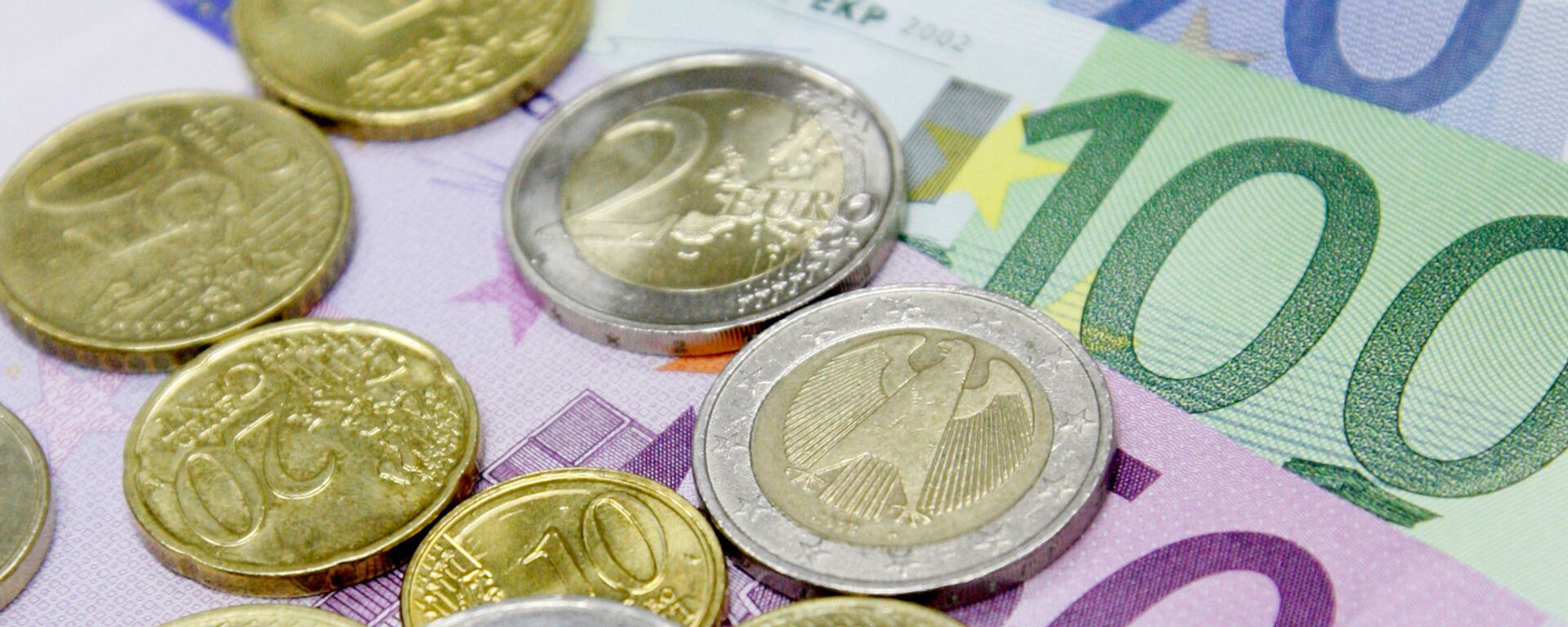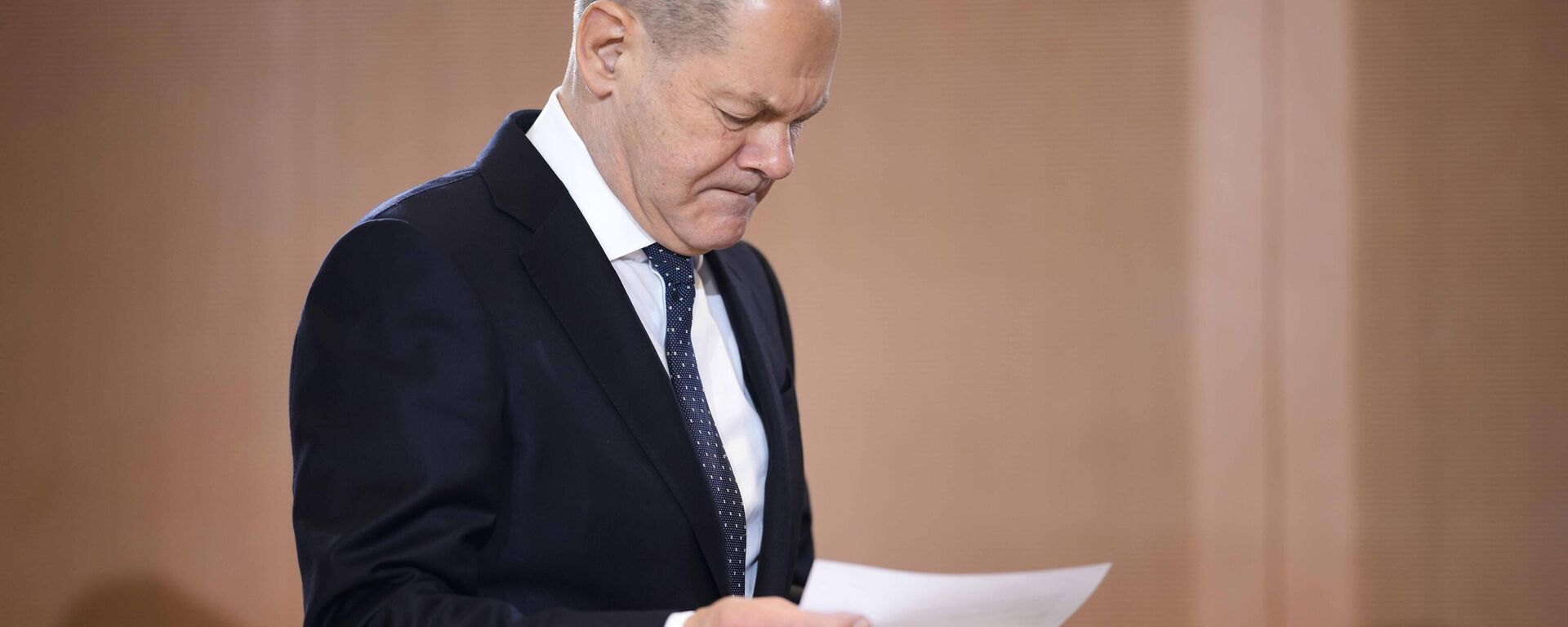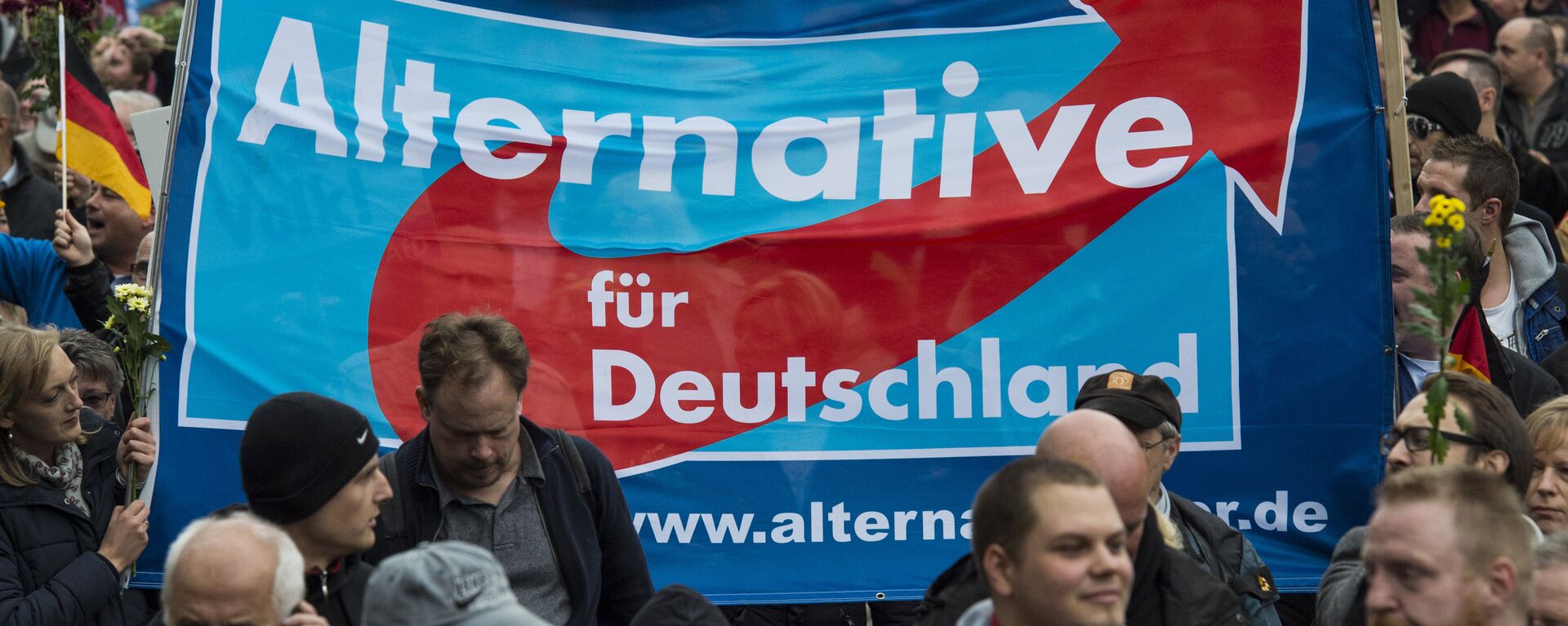https://sputnikglobe.com/20240428/german-industry-stuck-in-a-slump-despite-improving-worldwide-economy-thanks-to-anti-russian-policy-1118158036.html
German Industry Stuck in Slump Despite ‘Improving Worldwide Economy’ Thanks to Anti-Russian Policy
German Industry Stuck in Slump Despite ‘Improving Worldwide Economy’ Thanks to Anti-Russian Policy
Sputnik International
Russian officials warned their German counterparts in the spring of 2022 that a decision to reject cheap and reliable Russian pipeline gas in favor of tanker-shipped liquefied natural gas would cause manufacturers from the European industrial powerhouse to flee for better climes. Two years on, these warnings have become reality.
2024-04-28T10:53+0000
2024-04-28T10:53+0000
2024-04-28T11:11+0000
economy
germany
russia
olaf scholz
clemens fuest
business
basf
european union (eu)
bmw
porsche
https://cdn1.img.sputnikglobe.com/img/07e8/04/1c/1118157823_0:156:3000:1844_1920x0_80_0_0_4423e945f33ec4bce46cdab0ea98d853.jpg
Expectations of a modest rebound in economic growth across much of the world in 2024 aren’t being reflected in the performance of German industry, with manufacturers anticipating the sector’s downturn to continue into the foreseeable future.Data put out by the German Federal Statistical Office this week indicated that the country will likely be able to hobble along through the rest of 2024 without sinking back down into a 2022-2023-style recession thanks to a modest rebound in consumer spending, with growth expected to range from 0.1 to 0.3 percent through the remainder of the year.Indeed, before to the pandemic in 2020 and the escalation of the Ukraine crisis in 2022, industry made up nearly 30 percent of Germany’s GDP – an unusually high showing for an advanced Western economy, where outsourcing of manufacturing to the developing world has been the norm since the 1980s.Amid the current crisis, fueled by high energy costs and the rejection of Russian natural gas, hundreds of major German manufacturers, from automotive giants and the steel industry to the chemicals sector, have slowed production and/or relocated abroad – often into the welcoming arms of the United States, which has offered timely tax and production incentives and cheaper energy prices.In an earnings call on Thursday, Martin Brudermueller, CEO of German chemicals giant BASF, lamented that even though “global chemical production grew by 5.4 percent in Q1 2024 compared with the prior year quarter on account of a strong growth in China,” within the European Union, production increased only “slightly,” with BASF itself posting a loss.BASF – the 13th largest German company overall by market capitalization, is a bellwether of sorts for the German industrial economy, with its wares, including plastics, industrial gases, resins, solvents, and concrete chemicals, used across dozens of sectors and industries both in Germany and across the EU.But despite the grumblings coming out of the business sector, Germany’s politicians remain inexplicably upbeat about the prospects for industry, with Chancellor Olaf Scholz assuring last week that “since the start of the year, production in…energy-dependent sectors has increased noticeably –just like in the industry as a whole.”To back up this optimism, ifo Institute, a Munich-based economic think tank, commissioned a poll this month showing business expectations hitting a one-year high. But the think tank’s president, Clemens Fuest, admitted to Bloomberg that it was "puzzling" that German industry remains stuck in its rut despite an improving global economic picture.Hope Against HopeBut some analysts fear hopes aren’t enough, with the loss of Russian energy in 2022 compounding an array of structural problems, such as an aging workforce, an overbearing bureaucracy, underinvestment in infrastructure, and falling investment in education and other public services.Russian President Vladimir Putin warned back in May of 2022 that European countries’ “absolutely political” decision to stop the purchase of Russian energy would be “suicidal.” The “rejection of Russian energy resources means that Europe will systematically become the region with the highest energy costs in the world,” "seriously and according to some experts irrevocably – undermin[ing] the competitiveness of a significant part of European industry,” he said at the time.Germany’s non-systemic opposition has sounded the alarm about the direction the country is heading in, with AfD lawmaker Eugen Schmidt telling Sputnik in February that the government has demonstrated not only its “absolute incompetence,” but that it is “absolutely dependent on the United States,” acting as a “vassal” through “actual American agents of influence here in Germany.” Only that, he said, can explain the country’s “suicidal” economic and social policies.
https://sputnikglobe.com/20240415/eu-falls-behind-china-us-in-economic-competition-following-monumental-mistakes---iea-chief-1117935907.html
https://sputnikglobe.com/20240324/germanys-strike-madness-economy-tanks-as-industrial-action-hits-25-year-high-1117492570.html
https://sputnikglobe.com/20240426/afd-popularity-continues-to-ride-in-second-place-as-crack-downs-on-accused-espionage-cases-begin-1118118801.html
germany
russia
Sputnik International
feedback@sputniknews.com
+74956456601
MIA „Rossiya Segodnya“
2024
News
en_EN
Sputnik International
feedback@sputniknews.com
+74956456601
MIA „Rossiya Segodnya“
Sputnik International
feedback@sputniknews.com
+74956456601
MIA „Rossiya Segodnya“
why is german economy near recession, why is german industry moving away, what happened to german industry, who caused german economic slump
why is german economy near recession, why is german industry moving away, what happened to german industry, who caused german economic slump
German Industry Stuck in Slump Despite ‘Improving Worldwide Economy’ Thanks to Anti-Russian Policy
10:53 GMT 28.04.2024 (Updated: 11:11 GMT 28.04.2024) Russian officials warned their German counterparts in the spring of 2022 that a decision to reject cheap and reliable Russian pipeline gas in favor of tanker-shipped liquefied natural gas would cause manufacturers from the European industrial powerhouse to flee for better climes. Two years on, these warnings have become reality.
Expectations of a
modest rebound in economic growth across much of the world in 2024 aren’t being reflected in the performance of German industry, with manufacturers anticipating the sector’s downturn to continue into the foreseeable future.
Data put out by the German Federal Statistical Office this week indicated that the country will likely be able to hobble along through the rest of 2024 without sinking back down into a 2022-2023-style recession thanks to a modest rebound in consumer spending, with growth expected to range from 0.1 to 0.3 percent through the remainder of the year.
“Consumers are a bit more certain about developments and are happy to spend a bit more,” HSBC economist Anja Heimann told Bloomberg. Still, “we don’t really expect a strong pickup in Germany, because industry has such an important weight in overall growth,” she added.
Indeed, before to the pandemic in 2020 and the escalation of the Ukraine crisis in 2022, industry made up nearly 30 percent of Germany’s GDP – an unusually high showing for an advanced Western economy, where outsourcing of manufacturing to the developing world has been the norm since the 1980s.
Amid the current crisis, fueled by high energy costs and the rejection of Russian natural gas, hundreds of major German manufacturers, from automotive giants and the steel industry to the chemicals sector, have slowed production and/or relocated abroad – often
into the welcoming arms of the United States, which has offered timely tax and production incentives and cheaper energy prices.
In an
earnings call on Thursday, Martin Brudermueller, CEO of German chemicals giant BASF, lamented that even though “global chemical production grew by 5.4 percent in Q1 2024 compared with the prior year quarter on account of a strong growth in China,” within the European Union, production increased only “slightly,” with BASF itself posting a loss.
“We cannot yet confirm a fundamental turnaround in industry dynamics,” Brudermueller
said, reporting Q1 2024 sales down by 12 percent compared to the previous year, to €17.6 billion, caused “mainly due to lower sales prices, which declined across almost all segments.”
BASF – the
13th largest German company overall by market capitalization, is a bellwether of sorts for the German industrial economy, with its wares, including plastics, industrial gases, resins, solvents, and concrete chemicals, used across dozens of sectors and industries both in Germany and across the EU.
German automotive parts manufacturer Continental AG, another bellwether, whose products include tires, brake systems and powertrains for Volkswagen, Daimler, BMW and Porsche, offered a similarly pessimistic outlook, with CEO Nikolai Setzer telling shareholders Friday that the company has seen a “sluggish start to the year.”
But despite the grumblings coming out of the business sector, Germany’s politicians remain inexplicably upbeat about the prospects for industry, with Chancellor Olaf Scholz
assuring last week that “since the start of the year, production in…energy-dependent sectors has increased noticeably –just like in the industry as a whole.”
To back up this optimism, ifo Institute, a Munich-based economic think tank, commissioned a poll this month showing business expectations hitting a one-year high. But the think tank’s president, Clemens Fuest, admitted to Bloomberg that it was "puzzling" that German industry remains stuck in its rut despite an improving global economic picture.
“We see an improving worldwide economy, but this doesn’t seem to reach German manufacturing. We don’t see the recovery there yet. It will hopefully be coming but that may take some time,” Fuest said.
But some analysts fear hopes aren’t enough, with the loss of Russian energy in 2022 compounding an array of
structural problems, such as an aging workforce, an overbearing bureaucracy, underinvestment in infrastructure, and falling investment in education and other public services.
Russian President Vladimir Putin warned back in May of 2022 that European countries’ “absolutely political” decision to stop the purchase of Russian energy would be “suicidal.” The “rejection of Russian energy resources means that Europe will systematically become the region with the highest energy costs in the world,” "seriously and according to some experts irrevocably – undermin[ing] the competitiveness of a significant part of European industry,” he said at the time.
Germany’s non-systemic opposition has sounded the alarm about the direction the country is heading in, with AfD lawmaker Eugen Schmidt
telling Sputnik in February that the government has demonstrated not only its “absolute incompetence,” but that it is “absolutely dependent on the United States,” acting as a “vassal” through “actual American agents of influence here in Germany.” Only that, he said, can explain the country’s “suicidal” economic and social policies.





